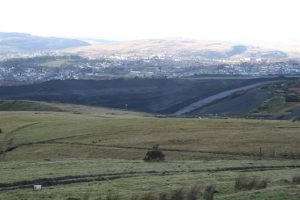THAT was much better.
At least from Conservative leader, Andrew RT Davies.
Last week, we reported on the difficulties Mr Davies got into when bandying around statistics with the First Minister. His performance fell flat and the subject didn’t play to his or his Party’s strengths.
At least from Conservative leader, Andrew RT Davies.
Last week, we reported on the difficulties Mr Davies got into when bandying around statistics with the First Minister. His performance fell flat and the subject didn’t play to his or his Party’s strengths.
REGULATIONS
BREACH PROMISES
This week, Mr Davies was back on ground about which the First Minister knows little and couldn’t care less: agriculture, and a Minister’s breach of repeated promises not to enact costly and onerous legislation during the pandemic.
Mr Davies said Labour’s Minister for Environment, Energy and Rural Affairs, Lesley Griffiths, betrayed farmers in Wales announcing the introduction of a Nitrate Vulnerable Zone (NVZ) across the whole country despite saying in the Senedd Chamber on seven separate occasions that she would not while the pandemic continues.
Mr Davies said: “We’re 10 months into this crisis, a crisis that has had a dramatic effect on all sectors of business including farming, and the Welsh Labour Government – propped up by the Lib Dem – decides to introduce a blanket NVZ across all of Wales when [Lesley Griffiths] had said she wouldn’t.
“Labour’s farming minister was quite clear throughout the course of 2020 and the pandemic. Labour promised farmers up and down Wales they wouldn’t look at introducing these regulations while we were still dealing with the coronavirus crisis. Labour has broken that promise.
“I asked Labour’s First Minister to personally intervene on behalf of farmers and rural communities across Wales and hold off introducing these regulations when we’re still in the grip of a pandemic. He wouldn’t. He wouldn’t even acknowledge that his Minister broke a promise made seven times.
“It’s yet another broken promise by the Labour Party, and shows that farmers and the Welsh public at large can’t trust Labour when it comes to protecting livelihoods and the food security of Wales and our United Kingdom.”
Mr Davies said Labour’s Minister for Environment, Energy and Rural Affairs, Lesley Griffiths, betrayed farmers in Wales announcing the introduction of a Nitrate Vulnerable Zone (NVZ) across the whole country despite saying in the Senedd Chamber on seven separate occasions that she would not while the pandemic continues.
Mr Davies said: “We’re 10 months into this crisis, a crisis that has had a dramatic effect on all sectors of business including farming, and the Welsh Labour Government – propped up by the Lib Dem – decides to introduce a blanket NVZ across all of Wales when [Lesley Griffiths] had said she wouldn’t.
“Labour’s farming minister was quite clear throughout the course of 2020 and the pandemic. Labour promised farmers up and down Wales they wouldn’t look at introducing these regulations while we were still dealing with the coronavirus crisis. Labour has broken that promise.
“I asked Labour’s First Minister to personally intervene on behalf of farmers and rural communities across Wales and hold off introducing these regulations when we’re still in the grip of a pandemic. He wouldn’t. He wouldn’t even acknowledge that his Minister broke a promise made seven times.
“It’s yet another broken promise by the Labour Party, and shows that farmers and the Welsh public at large can’t trust Labour when it comes to protecting livelihoods and the food security of Wales and our United Kingdom.”
FIRST MINISTER
DIGS A SLURRY PIT
While Mr Drakeford tried to bluster his way out of the corner by referring to the number of agricultural pollution incidents each week, he inadvertently dug himself deeper into the hole Lesley Griffiths prepared. Neither the number nor frequency of pollution incidents have increased and the majority of pollution incidents are both localised and minor. That can be shown by direct reference to the minuscule number of enforcement actions and the even smaller number of prosecutions arising from pollution incidents.
The Welsh Government’s claims that its environmental watchdog, Natural Resources Wales, has both the necessary powers and the necessary funding to tackle incidents. If the Welsh Government’s claims on either count stand up to scrutiny, the overwhelming majority of cases relating to agricultural pollution are of extremely limited impact. If the Welsh Government’s claims about NRW are an example of ‘gilding the lily’, the problem of agricultural pollution is one to which it has contributed by neutering its watchdog. It cannot have it both ways. But Mr Drakeford tried to, even after acknowledging there had been NO increase in alleged agricultural pollution incidents.
Mr Drakeford said: “The level of pollution incidents in the agriculture sphere is damaging the reputation of farmers, damaging our environment and damaging the ability of that industry, in the long run, to trade with other parts of the world. Given that the strength of our industry is the quality of the produce that it delivers, any delay would not be in the interests of the industry.”That last point begs the question that if a delay to the regulations is not in the industry’s interests now, why delay promised at all.
Mr Drakeford continued: “The implementation of the regulations will be done sensitively, they’ll be done alongside the industry.”
The Welsh Government’s claims that its environmental watchdog, Natural Resources Wales, has both the necessary powers and the necessary funding to tackle incidents. If the Welsh Government’s claims on either count stand up to scrutiny, the overwhelming majority of cases relating to agricultural pollution are of extremely limited impact. If the Welsh Government’s claims about NRW are an example of ‘gilding the lily’, the problem of agricultural pollution is one to which it has contributed by neutering its watchdog. It cannot have it both ways. But Mr Drakeford tried to, even after acknowledging there had been NO increase in alleged agricultural pollution incidents.
Mr Drakeford said: “The level of pollution incidents in the agriculture sphere is damaging the reputation of farmers, damaging our environment and damaging the ability of that industry, in the long run, to trade with other parts of the world. Given that the strength of our industry is the quality of the produce that it delivers, any delay would not be in the interests of the industry.”That last point begs the question that if a delay to the regulations is not in the industry’s interests now, why delay promised at all.
Mr Drakeford continued: “The implementation of the regulations will be done sensitively, they’ll be done alongside the industry.”
GOVERNMENT IGNORED
OWN REGULATOR
That last point would make a welcome change.
The largest source of river pollution in Wales has been pollution by water companies. Agricultural leaks are implicated in 15% of incidents.
As long ago as 2018, The Herald probed the incidence of river pollution. A Freedom of Information Act request that year revealed there were 2,700 incidents of river pollution in the preceding three years. Fifteen percent of 2700 is 405: that equates to 2.6 incidents each week attributable to agricultural pollution. Those numbers, as Mr Drakeford said, have not changed.
Of those 2,700 incidents, only ten resulted in civil sanctions.
At the time, Andrea Winterton of NRW told us: “We always seek to be proportionate in our enforcement, and the action we take will depend on the severity of the incident. Of the pollution incidents between 2013 and 2016, many of these were minor, small scale and short-lived, often making it difficult to find those responsible.“
While one pollution incident is one too many, as Andrew RT Davies recognised in the Senedd, the Welsh Government is taking a large hammer to crack a relatively small nut while ignoring major pollution causes.
The Welsh Government has ignored both its own environmental watchdog over the scope of the regulations and the industry group it convened to review the new rules. The decision of the Welsh Government is also contrary to the recommendations of its own advisory panel.
Natural Resources Wales warned the Welsh Government its pollution regulations could have the ‘perverse outcome’ of making water quality worse.
The official advice from the regulator was obtained as part of a freedom of information (FOI) request submitted by NFU Cymru. The advice also said NRW did not have enough resources to implement the new rules if they applied to all farm businesses across Wales.
NRW’s advice was given specifically on the Regulatory Impact Assessment (RIA) being carried out by the Welsh Government. That assessment should have assessed the impact on all farm businesses in Wales. The NRW advice suggests the Welsh Government did no such thing.
NRW also claimed the Welsh Government had ‘lost an opportunity’ in only considering two options – do nothing, or an all-Wales approach – and suggested the assessment did not follow the Welsh Government’s own RIA guidance on presenting a comprehensive range of implementation choices.
It also questioned the lack of analysis on water quality in the RIA and how proportionate the measures would be in areas where low nitrate concentrations are found, concluding the assessment would be ‘open to challenge’ from a number of stakeholders.
Legal action has already been threatened by NFU-Cymru.
The official advice from the regulator was obtained as part of a freedom of information (FOI) request submitted by NFU Cymru. The advice also said NRW did not have enough resources to implement the new rules if they applied to all farm businesses across Wales.
NRW’s advice was given specifically on the Regulatory Impact Assessment (RIA) being carried out by the Welsh Government. That assessment should have assessed the impact on all farm businesses in Wales. The NRW advice suggests the Welsh Government did no such thing.
NRW also claimed the Welsh Government had ‘lost an opportunity’ in only considering two options – do nothing, or an all-Wales approach – and suggested the assessment did not follow the Welsh Government’s own RIA guidance on presenting a comprehensive range of implementation choices.
It also questioned the lack of analysis on water quality in the RIA and how proportionate the measures would be in areas where low nitrate concentrations are found, concluding the assessment would be ‘open to challenge’ from a number of stakeholders.
Legal action has already been threatened by NFU-Cymru.
The Pollution Subgroup of the Welsh Land Management Forum facilitated by Natural Resources Wales has consistently argued for better enforcement and the promotion of good practice.
Those facts alone show the emptiness of Mr Drakeford’s words on the topic. They are of the same value as Lesley Griffiths’ seven empty promises.
MORE TARGETED
APPROACH NEEDED
TFA Cymru Chairman, Dennis Matheson, said “The vast majority of farms across Wales operate to very high standards of pollution control. Sadly, a tiny number of operators continue to flout the existing regulations and deserve to be penalised. However, the Welsh Government is using this as an excuse to hit the whole of the industry with costly new regulations.
“Tarring the whole of the industry with the same brush is not appropriate. Increasing the regulatory bar will do nothing to improve compliance amongst the small number of individuals who wilfully ignore the existing rules. Instead, the Welsh Government should be stepping up its enforcement of the existing rules.”
Mr Matheson continued: “As a member of the Pollution Subgroup it feels like we have been wasting our time meeting, discussing, debating and providing advice to Government. The Government didn’t even have the decency to consult with the Subgroup before announcing its decision. This is not evidenced-based policy-making, it’s a knee-jerk reaction and completely wrongheaded.”
Tenant farmers may struggle to meet the new requirements due to the constraints of their tenancy agreements.
“For many years, TFA Cymru has been highlighting the statutory and contractual restrictions that impact tenant farmers to the Welsh Government and provided advice as to how this could be overcome. However, the announcement contains no details about how the Welsh Government expects tenant farmers to comply.
“Tenants that meet opposition from their landlords could end up having to cease farming altogether, despite already operating to extremely high environmental standards. That surely cannot be right,” said Mr Matheson.
“Tarring the whole of the industry with the same brush is not appropriate. Increasing the regulatory bar will do nothing to improve compliance amongst the small number of individuals who wilfully ignore the existing rules. Instead, the Welsh Government should be stepping up its enforcement of the existing rules.”
Mr Matheson continued: “As a member of the Pollution Subgroup it feels like we have been wasting our time meeting, discussing, debating and providing advice to Government. The Government didn’t even have the decency to consult with the Subgroup before announcing its decision. This is not evidenced-based policy-making, it’s a knee-jerk reaction and completely wrongheaded.”
Tenant farmers may struggle to meet the new requirements due to the constraints of their tenancy agreements.
“For many years, TFA Cymru has been highlighting the statutory and contractual restrictions that impact tenant farmers to the Welsh Government and provided advice as to how this could be overcome. However, the announcement contains no details about how the Welsh Government expects tenant farmers to comply.
“Tenants that meet opposition from their landlords could end up having to cease farming altogether, despite already operating to extremely high environmental standards. That surely cannot be right,” said Mr Matheson.
RURAL COMMUNITIES
FACE BIG CHALLENGES
Cefin Campbell, Plaid Cymru’s lead candidate for the Mid and West Wales region, said: At a time when the UK Tory government has slashed £137 million from the support for Welsh agriculture, the Labour Welsh Government plans to make the whole of Wales a Nitrate Vulnerable Zone (NVZ), despite fierce opposition from farming unions.
“When conditions are favourable, farmers usually spread slurry on their fields between October and March, but the NVZ will ban slurry spreading for five months over the winter period. Slurry will have to be stored at a time when most cattle are kept indoors, which could result in farmers having to invest heavily in huge slurry tanks to accommodate the increased waste.
“‘As agriculture and our rural communities in general face huge challenges following the Brexit agreement and the effects of the Covid pandemic, the Conservatives take millions of pounds of badly needed money away from farmers, and Labour bring in draconian measures that will have a devastating effect on small or medium-sized dairy farms,’ said Cllr Cefin Campbell who is also Executive Board member with responsibility for Rural Affairs on Carmarthenshire County Council.
“Although I fully understand the crucial importance of protecting our waterways from slurry pollution, the Welsh Government should have taken a more targeted approach by implementing restrictions in specific areas or on farms that have a history of poor practice – as proposed by the government body Natural Resources Wales,’ he said.
“This blanket ban will punish the 95% of farmers who’ve worked tirelessly for generations to maintain that delicate balance between making a living and protecting the environment. It’s a grossly disproportionate over-reaction by Welsh Government.
“The investment needed by family-run farms to comply with these new restrictions could put their businesses at risk and even result in many leaving the land. The financial support offered by the Welsh Government to help farmersadapt to these new conditions is pitiful. The increased costs, coupled with the Tories cutting millions from agriculture aid, clearly shows that neither of the main parties can be trusted to support the farming industry, which is the backbone of our rural communities across mid and west Wales,” he added.
“When conditions are favourable, farmers usually spread slurry on their fields between October and March, but the NVZ will ban slurry spreading for five months over the winter period. Slurry will have to be stored at a time when most cattle are kept indoors, which could result in farmers having to invest heavily in huge slurry tanks to accommodate the increased waste.
“‘As agriculture and our rural communities in general face huge challenges following the Brexit agreement and the effects of the Covid pandemic, the Conservatives take millions of pounds of badly needed money away from farmers, and Labour bring in draconian measures that will have a devastating effect on small or medium-sized dairy farms,’ said Cllr Cefin Campbell who is also Executive Board member with responsibility for Rural Affairs on Carmarthenshire County Council.
“Although I fully understand the crucial importance of protecting our waterways from slurry pollution, the Welsh Government should have taken a more targeted approach by implementing restrictions in specific areas or on farms that have a history of poor practice – as proposed by the government body Natural Resources Wales,’ he said.
“This blanket ban will punish the 95% of farmers who’ve worked tirelessly for generations to maintain that delicate balance between making a living and protecting the environment. It’s a grossly disproportionate over-reaction by Welsh Government.
“The investment needed by family-run farms to comply with these new restrictions could put their businesses at risk and even result in many leaving the land. The financial support offered by the Welsh Government to help farmersadapt to these new conditions is pitiful. The increased costs, coupled with the Tories cutting millions from agriculture aid, clearly shows that neither of the main parties can be trusted to support the farming industry, which is the backbone of our rural communities across mid and west Wales,” he added.















Add Comment